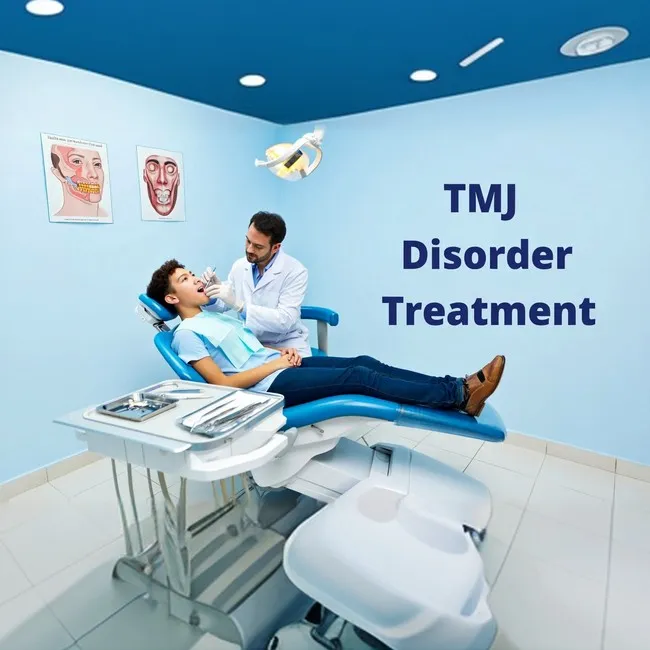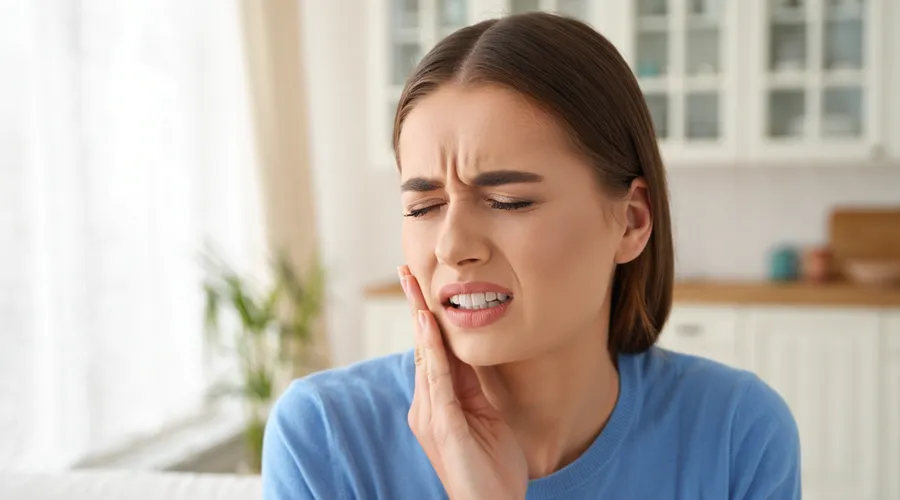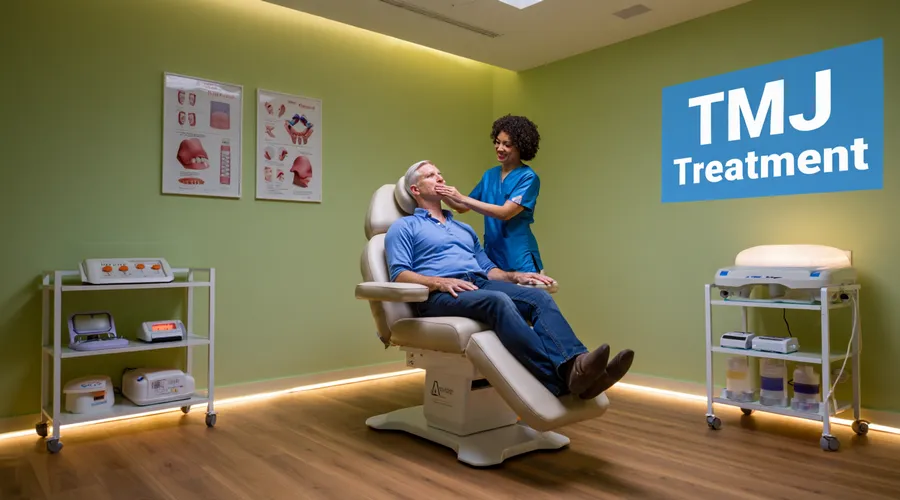TMJ Therapy in Lorton VA
The temporomandibular joint (TMJ), the hinge connecting your jawbone to your skull, allows you to talk, chew, and yawn. When this joint malfunctions, it can lead to a range of uncomfortable and debilitating symptoms, collectively known as temporomandibular joint disorders (TMD).
TMJ therapy encompasses a variety of treatments aimed at alleviating pain, restoring function, and improving the overall quality of life for individuals suffering from TMD.

Why TMJ disorder occurs?

The causes of TMJ disorder are often multifactorial, making diagnosis and treatment challenging. While a direct injury to the jaw or joint can trigger TMD, other contributing factors include bruxism (teeth grinding or clenching), arthritis, stress, poor posture, and even genetics.
The interplay between these factors can vary significantly from person to person, requiring a personalized approach to therapy. Identifying the specific root causes of an individual’s TMJ disorder is a critical first step in developing an effective treatment plan.
What are the symptoms of TMJ disorder?

Symptoms of TMJ disorder can be diverse and often mimic other medical conditions, leading to misdiagnosis and delayed treatment.
Common symptoms include:
- pain in the jaw, face, neck, and shoulders
- clicking, popping, or grating sounds when opening or closing the mouth
- limited jaw movement
- difficulty chewing or swallowing
- headaches
- earaches
- dizziness
The intensity and frequency of these symptoms can fluctuate, further complicating diagnosis. A thorough evaluation by a qualified healthcare professional, such as a dentist specializing in TMJ disorder or a physical therapist, is essential for accurate diagnosis.
What does TMJ therapy offer in Lorton VA?

TMJ therapy offers a range of non-surgical and surgical options tailored to the individual’s specific needs and condition.
Non-surgical treatments are typically the first line of defense and focus on pain management, muscle relaxation, and improving joint function.
These treatments may include:
- Self-care strategies:
Simple lifestyle modifications such as avoiding hard or chewy foods, using ice or heat packs, practicing relaxation techniques, and improving posture can significantly reduce symptoms. - Medications:
Pain relievers, muscle relaxants, and anti-inflammatory drugs can help manage pain and inflammation associated with TMD. - Physical therapy:
Exercises to strengthen jaw muscles, improve range of motion, and correct posture are often prescribed to restore proper joint function. Manual therapy techniques, such as massage and joint mobilization, can also be beneficial. - Splint therapy:
Custom-made oral appliances, also known as splints or night guards, can help stabilize the jaw joint, reduce teeth grinding, and alleviate muscle tension. Different types of splints exist, each designed for specific TMD conditions. - Injections:
In some cases, injections of corticosteroids or botulinum toxin (Botox) into the jaw muscles may be used to reduce pain and muscle spasms.
When non-surgical treatments fail to provide adequate relief, surgical options may be considered. These procedures are typically reserved for severe cases of TMD involving structural damage to the joint.
Surgical options include arthroscopy, arthrocentesis, and, in rare cases, open-joint surgery. The decision to pursue surgery should be made in consultation with a qualified oral and maxillofacial surgeon.
Are you considering TMJ treatment?
Book an Appointment Today

The specialists of the Lorton Dentist will conduct a detailed consultation and offer the necessary type of TMJ therapy for your treatment.
If you have bruxism or problems with your bite, you will be referred to a specialist at our clinic.
You can contact the practice online or call the number provided to schedule an appointment.
What determines the success of TMJ therapy in Lorton, VA?
The success of TMJ therapy relies heavily on patient compliance and adherence to the treatment plan. Regular exercise, proper posture, and stress management are crucial for long-term symptom management. Furthermore, maintaining open communication with the healthcare provider is essential for monitoring progress and making necessary adjustments to the treatment plan.
With a comprehensive and personalized approach, TMJ therapy can effectively alleviate pain, restore function, and improve the quality of life for individuals suffering from TMD.
What is the future of TMJ therapy?
Looking ahead, research continues to explore new and innovative approaches to TMJ therapy. Areas of investigation include the use of advanced imaging techniques for more accurate diagnosis, the development of novel medications to target specific TMD mechanisms, and the exploration of regenerative medicine therapies to repair damaged joint tissues.
As our understanding of TMD evolves, so too will the therapeutic options available to those who suffer from this debilitating condition, offering hope for a future with less pain and improved function. The future of TMJ therapy looks promising, driven by a commitment to improving the lives of individuals affected by this complex disorder.
FAQ
When should you see a doctor for TMJ symptoms?
If you are experiencing persistent jaw pain, limited jaw movement, or other TMJ symptoms, it is important to see a dentist, oral surgeon, or physician. Early diagnosis and treatment can help prevent chronic problems and improve your quality of life.
Is TMJ a chronic condition?
TMJ can be a chronic condition, but many people find that their symptoms improve with conservative treatment. Early diagnosis and following your doctor’s treatment plan can help you manage TMJ and improve your quality of life. It’s important to remember that every case of TMJ is unique, and your treatment approach should be tailored to your individual needs.
Can TMJ be prevented?
While it is not always possible to prevent TMJ, there are steps you can take to reduce your risk of developing the condition:
- Manage stress: Find healthy ways to cope with stress, such as exercise, meditation, or hobbies.
- Avoid teeth grinding: If you grind your teeth, talk to your dentist about a mouth guard.
- Proper posture: Maintain good posture, especially when working at a computer.
- Avoid hard and chewy foods: Limit your intake of hard, chewy foods and chewing gum.
- Treat any bite problems: See an orthodontist if you have an abnormal bite.
